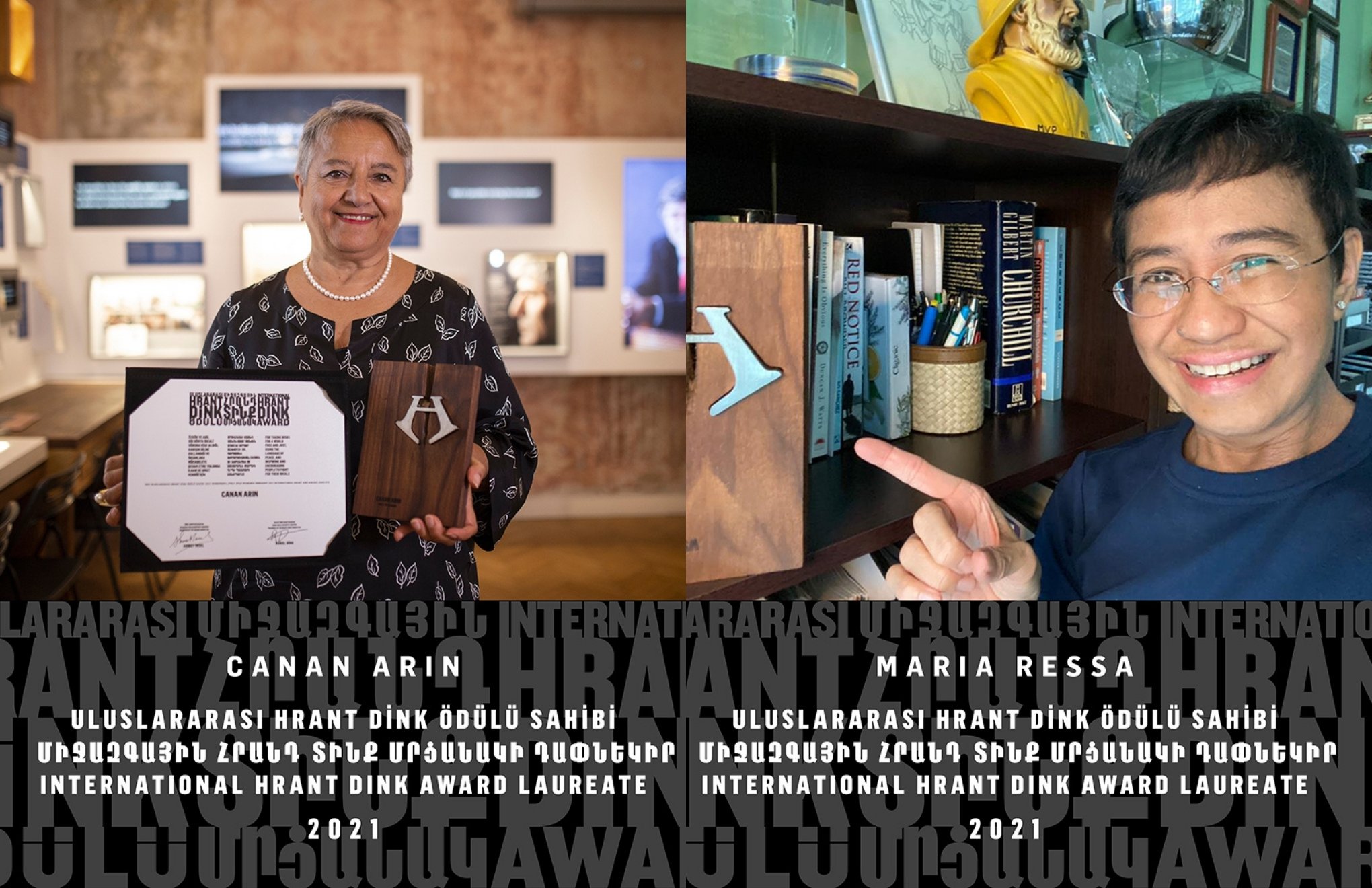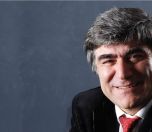Click to read the article in Turkish / Kurdish
The 13th International Hrant Dink Award has been presented at an online ceremony streamed on the Hrant Dink Foundation accounts.
This year's awards have been granted to investigative journalist Maria Ressa, who defends press freedom in the Philippines under difficult political conditions and high personal risks, and women's rights activist and lawyer Canan Arın, who persistently continues defending gender equality and her struggle against gender based violence in Turkey.
Narrated by Defne Kayalar in Turkish and by Esra Dermancıoğlu in English, the ceremony was held at the 23.5 Hrant Dink Site of Memory.
'Women's resistance is our only source of hope'
"Amid all the atrocities, amid this horrible picture, women's resistance and solidarity remains our only source of hope and courage." said Canan Arın, women's rights activist and lawyer in her acceptance speech.
'We are not naïve or foolish'
Laureate Maria Ressa with her message from the Philippines briefly stated the following: "To journalists and activists who continue to fight: We have to stay the course. Sometimes, people say that you are naïve or foolish. People say that about us. We are not."
'We stand for solidarity, equality, justice...'
Hrant Dink's wife and President of the Hrant Dink Foundation Rakel Dink welcomed the guests on behalf of the Foundation and stated, "At the Hrant Dink Foundation, we stand for solidarity, goodness, equality, justice, including the right to life for the environment, nature, and human beings."
'Speaking up together is our foremost duty'
Agnes Callamard, the Secretary General of Amnesty International, gave the opening speech which reflected on the struggle for human rights over the past year. She ended her speech as follows: "We consider this our foremost duty: To speak up together when many may be prevented from doing so, to speak truth to power, no matter the size of power."
Performances
Alongside the acceptance speeches of the laureates, musical performances were also present at the ceremony.
Ezhel's new song Mayrig [Mother], met with the audience for the first time, Pervin Chakar, Ertan Tekin and Ayta Sözeri gave unique performances with original melodies. With Songül Öden's narration, Iraz Akçam, Ayça Bildik, Banu Fotocan, Gülçin Kültür Şahin, Zeynep Şengöz, Nesrin Uçarlar brought to life a song by Nazan Öncel giving voice to the injustices women face.
The ceremony's music supervisor Arto Tunçboyacıyan brought together musicians from Armenia; Vahagn Hayrapetyan, Gohar Hovhannisyan, Kamarama, Tmbata, Tsakhruk Ethno Music Group of Specialized Children's Home of Kharberd, Yerevan Saxophone Quartet and Wood Winds Project enriched the ceremony with their folkloric tunes and rich melodies.
Jury
This year's jury is composed of 2020 laureate human rights activist Osman Kavala, women's rights activist Mozn Hassan, director Emin Alper, writer Tanıl Bora, director Robert Guediguian, lawyer Viviana Krsticevic, child rights activist Molly Melching, writer and diplomat Şafak Pavey, political scientist Füsun Üstel and President of the Hrant Dink Foundation Rakel Dink.
Inspirations
During the ceremony of International Hrant Dink Awards, people and institutions from Turkey and all around the world, who shed light to humanity with their struggles were acknowledged as the 'Inspirations' of 2021. Among the Inspirations of this year, there are human, environmental, refugee and women's rights defenders from Turkey to Russia, Myanmar to the United States, Belarus to Kenya, as well as inspirational individuals and initiatives with their demands for peace, equal citizenship, democracy and justice:
- In Lamu, Kenya, a UNESCO cultural heritage site, local women, farmers, environmental activists, and civil society organisations protested plans to construct a coal-fired power plant and went to court to halt the project. The construction was halted following a court ruling, which came after many years of struggle. The cultural heritage of Lamu was protected.
- In Glasgow, Scotland, when the police raided a house and put two migrants in a van to deport them, they were met with backlash from the residents of the neighbourhood. A crowd of protesters surrounded the van and one person lied under the van to stop it from driving away. Following protests staged by Glaswegians and the neighbourhood residents, who were united against discriminatory policies towards migrants, the deportation procedures against the two migrants were suspended.
- In Istanbul, following the appointment of a trustee by the President of the Republic as rector of Istanbul's Boğaziçi University, students, academics, and graduates called for the university rector to step down in defense of the principles of the university and academic and administrative autonomy. When their call went unheeded, they then proceeded to stage peaceful protests to draw attention to the two faculties established overnight in contravention of the laws, and how these developments and impositions damage the life at the university. The trustee rector was dismissed through a presidential decree, after which his deputy took over the role of rector. Students, academics, and graduates are continuing to call for democratic elections to be held to determine the next rector.
- In Myanmar, the army, not happy with the election results, took over the administration on the pretext that the election had been rigged. Many politicians were detained, and a state of emergency was declared. Following the military coup, despite armed intervention and the detention of thousands of individuals, the people continued to protest in large numbers and did not abandon their call for democracy.
- In Antep, Kırkayak Culture, Arts, and Nature Association is continuing to fight prejudice and discrimination against migrants, refugees, and other disadvantaged groups within the community through artistic activities. By the way of the film festivals, exhibitions, and plays it organises, the association promotes solidarity, engagement, and diversity.
- In the United States of America, following Donald Trump's discriminatory rhetoric against Asians in the context of the coronavirus pandemic, hate speech and attacks against Asians are on the rise. The 'Stop Asian Hate' protests, which began following an armed attack targeting eight people including six Asians, had repercussions all around the world.
- In İkizdere, Rize, the local population, primarily women and environmental activists launched protests against plans to construct a quarry on the coast. The protesters aim to draw attention to the destructive force of the construction and the quarry on the natural habitat and wildlife. They are continuing to resist despite the crackdown.
- In India, a group of women from the Dalit class who are considered to be apart from and below the caste system, set up a news agency that is entirely staffed by women. The agency creates news reports about incidents of gender-based violence as well as the problems, injustices, and the pressure witnessed in a wide range of areas from national government to the position of women in the household.
- In Belarus, people took to the streets following the re-election of Alexandre Lukashenko in 2020 after 27 years in power. Staging mass protests, they called for fair and equitable elections. An unjust tax reform introduced in Colombia against the backdrop of deepening poverty sparked mass protests including those organised by trade unions. In Russia, many cities, including the capital Moscow, saw large protests following the detention of the opposition leader Navalny. In all these protests, which took place in different cities in three different countries, large groups of protesters called for democracy, efforts to fight corruption, justice, and human rights. They did not yield even after law enforcement responded with a violent crackdown and hundreds were detained.
- Following Poland's and Turkey's decision to withdraw from the Istanbul Convention and Hungary's announcement that it will not ratify the Convention, the streets were filled with protests from women's rights and LGBTI+ groups. The governments may have abandoned the convention, yet large groups are expressing, on every occasion, their resolve to continue this struggle in defense of gender equality and against all forms of violence and patriarchy.
- In 2021, large fires broke out and lasted for days in many places around the world from Northern and Southern America to Russia, Southern Europe, Africa, and Australia. The wildfires also ravaged Turkey's Aegean and Mediterranean coasts. Thousands joined hands in volunteering to help all living beings that once inhabited the forests destroyed by the fires, as well as people who had to leave their homes. As we witness the striking consequences of the global climate crisis, we are calling for urgent measures to be introduced around the world.
About Canan ArınShe offered pro bono services to women who needed legal aid in violence against women and divorce cases. In 1990, along with thirteen other women, she co-founded the Purple Roof Women's Shelter Foundation (Mor Çatı Kadın Sığınağı Vakfı) to combat violence against women and strengthen solidarity and assistance among women. In 1997, she took part in the founding of the Association for Supporting and Training of Women Candidates (KA.DER), campaigning for greater participation and representation of women in politics. She has been one of the founders of the Istanbul Bar Association Women Rights' Enforcement Centre. She organised numerous training seminars for lawyers taking up cases of violence against women in an effort to inform them about the male violence against women and how they should communicate with women throughout the proceedings. In the early 1990s, when she was in the US, inspired by the UN designation of November 25th as the International Day for the Elimination of Violence against Women, she paved the way for and led the efforts of holding meetings on this very date in Turkey, first at Mor Çatı and later across the country. In 2011, during her speech at a training seminar entitled "Violence against Women and Women's Rights' Law" organised by the Antalya Bar Association, while explaining how early marriage was a common phenomenon in Turkey throughout its history, in order to better illustrate her point, she referred to the marriages of the Prophet Mohammed as well as the Turkish president of the time. A group of male lawyers, who did not take part in this seminar, filed a criminal complaint against her; she stood trial on charges of "publicly degrading religious values, insulting the Prophet of Islam and the President, and inciting the public", facing up to 5 years in prison. In 2012, she was detained by the police in Antep at the crack of dawn. She was released after being questioned on the alleged charges. The lawsuit initiated against her ended neither in conviction or sentence, nor in acquittal. The criminal proceedings were suspended. In 2012, she greatly contributed to Turkey's bid to become the first country to ratify the Istanbul Convention; she defied Turkey's decision to pull out of the Convention in early 2021. She draws attention to the fact that the judicial system's violation of women's rights is one of the reasons for increasing violence against women in Turkey. * Source: Hrant Dink Foundation |
About Maria RessaShe was born in 1963 in Manila. She lost her father when she was one year old. At 10, she moved to the US with her family. She obtained her undergraduate degree in molecular biology and theatre, and her Bachelor of Arts in English from Princeton University. In 1986, following the ousting of dictator Ferdinand Marcos, she returned to the Philippines and researched about political theatre at the University of the Philippines Diliman. In 1987, she started working as a journalist at the state-run television; soon after, she co-founded an independent production company. She worked for CNN as an investigative reporter for 18 years, focusing on terrorism in Southeast Asia. As bureau chief, she opened CNN's Manila bureau and later its Jakarta bureau. She came home to the Philippines in 2005, to lead its largest news group, which she did for 6 years. In 2012, along with three women journalists, she co-founded Rappler, the top digital only news site in the country currently employing about 100 journalists. In 2015, in her interview with Rodrigo Duterte during the presidential election campaign, she made him confess his killing of three people in the 1980s in Davao while he was the mayor of the city. Together with her colleagues at Rappler, she exposed the extrajudicial killings and human rights violations in Duterte's "war on corruption". She came under government pressure, while investigating the "troll army" mobilised after Duterte's election as the president in 2016. She faced a number of lawsuits and stood trial on charges of tax evasion and foreign ownership violations in the media among others, all requiring prison sentences. During these proceedings, the court issued 10 detention orders, in eight of which she was released on bail. In February 2019 she was detained on charges of "cyber libel", which was seen by the international community as a politically-motivated act. Most recently, in August 2021, the charges brought against her due to her news coverage of Duterte was dismissed by the court. Numerous lawsuits against her are still pending. As a leading journalist of the Philippines, her struggle against disinformation, fake news, and silencing of the independent media also received international acclaim. She published two books on Al Qaida's acts of terror in Southeast Asia. She lectured at Princeton University as well as the University of the Philippines, teaching politics and media in Southeast Asia as well as broadcast journalism. She was named Time Magazine's 2018 Person of the Year along with journalists from around the world combating fake news. She has been one of the leading figures on the Information and Democracy Commission launched by Reporters Without Borders. She was awarded numerous international prizes. She is a fearless advocate of press freedom while operating under difficult political circumstances and taking personal risks; and persevering in bringing to public attention the unlawful practices of the government and its rights violations during the war on drugs, despite the countless threats she received due to her news reports. She continues to work meticulously as an "investigative reporter". * Source: Hrant Dink Foundation |
About International Hrant Dink Award
International Hrant Dink Award is presented every year to individuals, organizations or groups that work for a free and just world free from discrimination, racism and violence, who take personal risks for achieving those ideals, who break the stereotypes and use the language of peace and by doing so give inspiration and hope to others. By means of this Award, the Hrant Dink Foundation aims to remind all those who struggle for these ideals that their voices are heard, their works are visible, they are not alone, and also to encourage everyone to fight for their ideals.
Each year the award is granted to two individuals; one from Turkey and one from abroad. In addition to the award itself, after an annual scanning and reviewing process, the Award Committee makes a selection of individuals, institutions, organisations and initiatives that pursue activities in line with the principles of Hrant Dink Award and announces their names to the public during the award ceremony under the title of "Sparks" or "Inspirations".
Award winners
The International Hrant Dink Award was previously presented to human rights activist Osman Kavala and women's rights activist Mozn Hassan in 2020, Nebahat Akkoç, the founder of KAMER, who has been working to raise awareness about women's human rights for many years, and Agnes Kharshiing, who has been fighting for the rights and environmental rights of the poor, women, children and disadvantaged people in the region where she lives in India in 2019, human rights defender Murat Çelikkan and human rights organizations Mwatana were awarded in 2018; lawyer Eren Keskin, who is bringing human rights violations to the agenda of both Turkey and international community by taking all the risks for years, and Chinese artist Ai Weiwei, who draws attention to the inequalities and human rights violations all over the world in 2017; Theresa Kachindamoto, chief of the tribe working on children's human rights and education rights in Malawi, and to the Diyarbakır Bar Association, fighting for human rights and the rule of law in 2016; women's rights advocate Samar Badawi from Saudi Arabia, and KAOS GL, fighting for LGBT rights and equality in Turkey in 2015; Şebnem Korur Fincancı, forensic expert and human rights advocate, and activist Angie Zelter in 2014; to human rights advocate Nataša Kandić and Turkey's longest continuing act of civil disobedience who are searching for their lost loved ones Saturday Mothers / People in 2013; writer İsmail Beşikçi and human rights organization International 'Memorial' Community in 2012, journalist, writer Ahmet Altan and journalist, human rights defender Lydia Cacho in 2011; Turkey Conscientious Objection Movement and jurist Baltasar Garzón in 2010; journalist-writer Alper Görmüş, and journalist-writer Amira Hass in 2009. (KÖ/SD)







